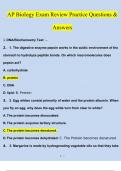Ap biology exam review - Study guides, Class notes & Summaries
Looking for the best study guides, study notes and summaries about Ap biology exam review? On this page you'll find 373 study documents about Ap biology exam review.
Page 4 out of 373 results
Sort by
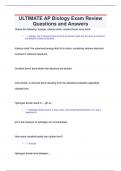
-
ULTIMATE AP Biology Exam Review Questions and Answers
- Exam (elaborations) • 20 pages • 2024
-
- $11.49
- + learn more
ULTIMATE AP Biology ULTIMATE AP BiologyULTIMATE AP BiologyULTIMATE AP BiologyULTIMATE AP BiologyULTIMATE AP BiologyULTIMATE AP BiologyULTIMATE AP BiologyULTIMATE AP BiologyULTIMATE AP BiologyULTIMATE AP BiologyULTIMATE AP BiologyULTIMATE AP BiologyULTIMATE AP BiologyULTIMATE AP BiologyULTIMATE AP BiologyULTIMATE AP BiologyULTIMATE AP BiologyULTIMATE AP BiologyULTIMATE AP BiologyULTIMATE AP BiologyULTIMATE AP BiologyULTIMATE AP BiologyULTIMATE AP BiologyULTIMATE AP BiologyULTIMATE AP BiologyULTI...
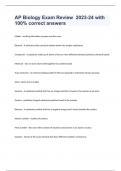
-
AP Biology Exam Review 2023-24 with 100% correct answers
- Exam (elaborations) • 31 pages • 2023
- Available in package deal
-
- $13.49
- + learn more
Matter - anything that takes up space and has mass Element - A substance that cannot be broken down into simpler substances Compound - A substance made up of atoms of two or more different elements joined by chemical bonds Molecule - two or more atoms held together by covalent bonds Trace elements - An element indispensable for life but required in extremely minute amounts. Atom - Basic unit of matter Neutron - A subatomic particle that has no charge and that is found in the nu...
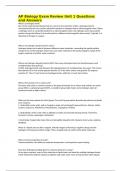
-
AP Biology Exam Review Unit 1 Questions and Answers
- Exam (elaborations) • 8 pages • 2024
-
- $10.39
- + learn more
AP Biology Exam Review Unit 1 Questions and Answers What is a hydrogen bond? One of the weak chemical bonds that are central to the chemistry of life; a hydrogen bond is characterized by the non-covalent attraction between a hydrogen and an electronegative atom. When a hydrogen atom is covalently bonded to an electronegative atom, the hydrogen atom has a partial positive charge that allows it to be attracted to a different electronegative atom nearby. Typically, it is attracted to nitrogen or ...
AP Biology Exam Review Practice Questions | Questions with 100% Correct Answers | Verified | Updated 2024
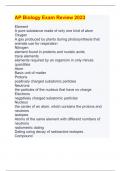
-
AP Biology Exam Review 2023
- Exam (elaborations) • 45 pages • 2024
- Available in package deal
-
- $12.99
- + learn more
AP Biology Exam Review 2023 Element A pure substance made of only one kind of atom Oxygen A gas produced by plants during photosynthesis that animals use for respiration Nitrogen element found in proteins and nucleic acids trace elements elements required by an organism in only minute quantities Atom Basic unit of matter Protons positively charged subatomic particles Neutrons
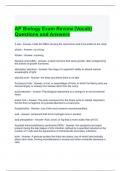
-
AP Biology Exam Review (Vocab) Questions and Answers 2024
- Exam (elaborations) • 107 pages • 2024
- Available in package deal
-
- $14.99
- + learn more
AP Biology Exam Review (Vocab) Questions and Answers

-
AP Biology Exam Review | Questions And Answers Latest {2024- 2025} A+ Graded | 100% Verified
- Exam (elaborations) • 29 pages • 2024
- Available in package deal
-
- $13.48
- + learn more
AP Biology Exam Review | Questions And Answers Latest {} A+ Graded | 100% Verified
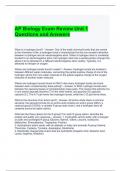
-
AP Biology Exam Review Unit 1 Questions and Answers
- Exam (elaborations) • 8 pages • 2024
- Available in package deal
-
- $11.99
- + learn more
AP Biology Exam Review Unit 1 Questions and Answers

-
AP Biology Exam Review Questions and Answers- Graded A
- Exam (elaborations) • 28 pages • 2024
- Available in package deal
-
- $12.49
- + learn more
AP Biology Exam Review Questions and Answers
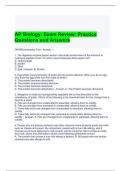
-
AP Biology Exam Review Practice Questions and Answers / Graded A
- Exam (elaborations) • 46 pages • 2024
- Available in package deal
-
- $12.49
- + learn more
AP Biology Exam Review Practice Questions and Answers

Study stress? For sellers on Stuvia, these are actually golden times. KA-CHING! Earn from your study resources too and start uploading now. Discover all about earning on Stuvia

